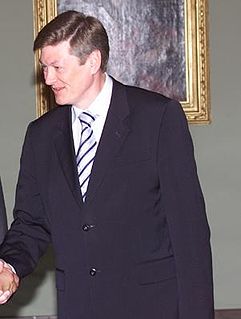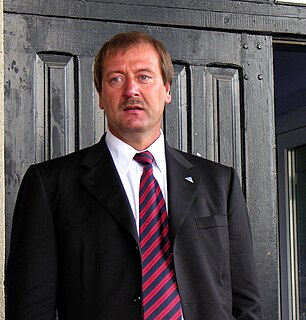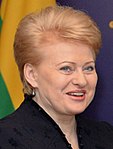
Politics of Lithuania takes place in a framework of a unitary semi-presidential representative democratic republic, whereby the President of Lithuania is the head of state and the Prime Minister of Lithuania is the head of government, and of a multi-party system.

Valdas Adamkus is a Lithuanian politician. He was the President of Lithuania from 1998 to 2003 and again from 2004 to 2009.

Artūras Paulauskas[ɐrˈtuːrɐs pɐʊˈɫɐ̂ˑʊskɐs](listen) is a Lithuanian politician. He was the Speaker of Seimas, the parliament of Lithuania, from 2000 to 2006, and he served as Acting President of Lithuania from 6 April 2004 to 12 July 2004.

Presidential elections were held in Lithuania in June 2004 alongside European elections. They were held following the impeachment of President Rolandas Paksas, who was elected in January 2003. Paksas was impeached for allegedly leaking classified material, and granting citizenship to Russian businessman Jurij Borisov in exchange for financial support. The Constitutional Court of Lithuania ruled that Paksas could not seek re-election as president. In accordance with the constitution, the speaker of parliament, Artūras Paulauskas, became acting president pending new elections.

Party Order and Justice, formerly the Liberal Democratic Party, is a right-wing national-conservative political party in Lithuania that self-identifies as 'left-of-centre'. It has eleven members in the Seimas, the unicameral Lithuanian parliament.

Parliamentary elections were held in Lithuania on 10 October 2004, with a second round on 24 October 2004 in the constituencies where no candidate won a majority in the first round of voting. All 141 seats in the Seimas were up for election; 71 in single-seat constituencies elected by majority vote and the remaining 70 in a nationwide constituency based on proportional representation.

Government of the Republic of Lithuania is the cabinet of Lithuania, exercising executive power in the country. Among other responsibilities, it executes laws and resolutions of the parliament, the Seimas, and the decrees of the President, manages state property and, together with the President, executes the foreign policy of the country. The Government also has the right of legislative initiative, puts together the state budget and presents it to the Seimas for approval.

Presidential elections were held in Lithuania on 17 May 2009. A run-off would have been held on 7 June 2009, but was not necessary as Dalia Grybauskaitė was elected with 69 percent of the vote, with voter turnout just over the 50% threshold for the result to be validated. She took office on 12 July as the country's first female president.

Parliamentary elections were held in Lithuania on 8 October 2000. All 141 seats in the Seimas were up for election, 71 of them in single-seat constituencies based on first-past-the-post voting; the remaining 70, in a nationwide constituency based on proportional representation. Altogether, around 700 candidates competed in the single-seat constituencies, while over 1,100 candidates were included in the electoral lists for the nationwide constituency.

Parliamentary elections were held in Lithuania on 14 October 2012, with a second round on 28 October in the constituencies where no candidate won a majority in the first round of voting. All 141 seats in the Seimas were up for election; 71 in single-seat constituencies elected by majority vote and the remaining 70 in a nationwide constituency based on proportional representation. Together with the elections, a referendum on the construction of a new nuclear power plant was held.

Valentinas Mazuronis is a Lithuanian politician and a member of the European Parliament.

Parliamentary elections were held in Lithuania on 9 October 2016, with a second round held on 23 October in the constituencies where no candidate won a majority in the first round of voting. All 141 seats in the Seimas were up for election; 71 in single-member constituencies elected by majority vote and the remaining 70 in a nationwide constituency based on proportional representation.
The Eighth Seimas of Lithuania was a parliament (Seimas) elected in Lithuania. Elections took place on 8 October 2000. The Seimas commenced its work on 19 October 2000 and served a four-year term, with the last session on 11 November 2004.

The First Brazauskas Cabinet was the 12th cabinet of Lithuania since 1990. It consisted of the Prime Minister and 13 government ministers.

The Second Paksas Cabinet was the 11th cabinet of Lithuania since 1990. It consisted of the Prime Minister and 13 government ministers.
Naglis Puteikis is a Lithuanian politician and member of the Seimas.

Saulius Skvernelis is a Lithuanian politician who has been Prime Minister of Lithuania since 2016. He is also a member of the Seimas. Previously he served as police commissioner, and he was Minister of the Interior from 2014 to 2016.

Presidential elections are scheduled to be held in Lithuania on 12 May 2019. Incumbent president Dalia Grybauskaitė is term-limited.
The Lithuanian order of precedence is a nominal and symbolic hierarchy of important positions within the Government of Lithuania. Administered by the Ministry of Foreign Affairs, the hierarchy does not determine the order of succession for the office of President of the Republic of Lithuania, which is instead specified by the Constitution of Lithuania.





















